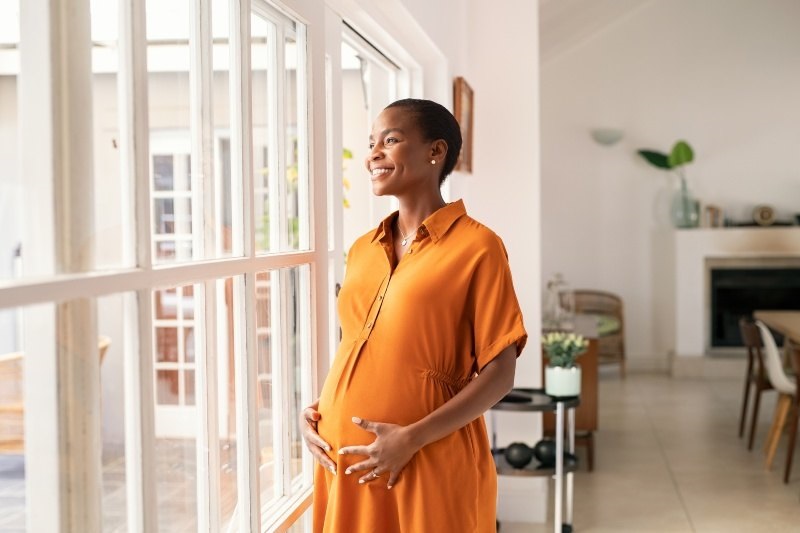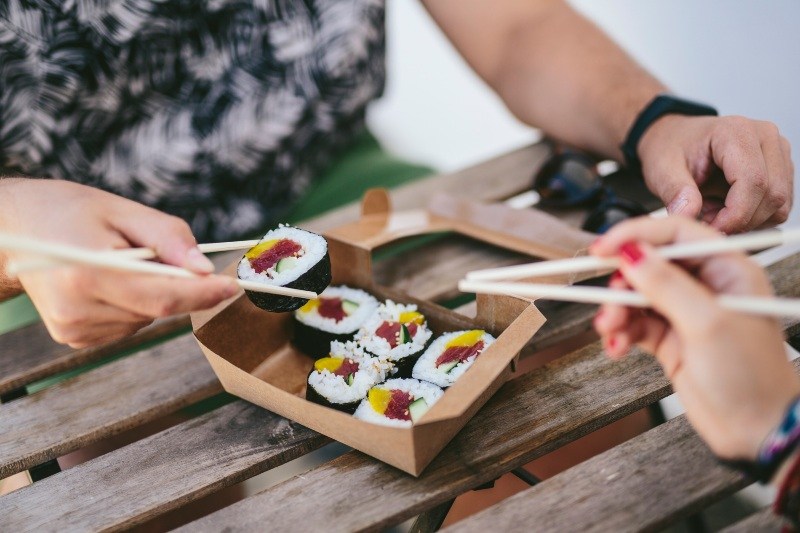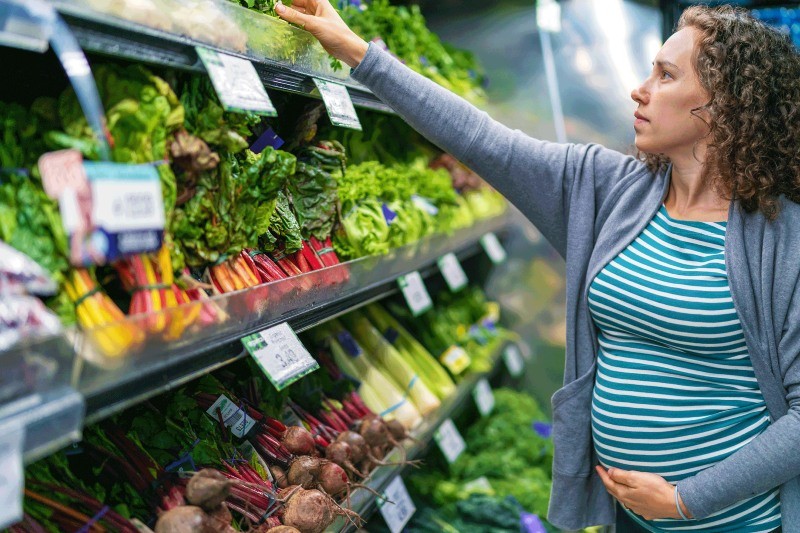- Home
- Mind & body
- Your guide to eating safe during pregnancy
At CBHS we help you manage your health challenges. We believe in offering you the services, support and tools you need to live your best life.
Health and Wellness Programs are available to support eligible members towards a healthier lifestyle. Each Health and Wellness Program is subject to its own eligibility criteria.
Contact us for more information and to confirm your eligibility for a program.
Your guide to eating safe during pregnancy

Whether you’ve been pregnant before, or you’re into your very first pregnancy, you already know how important a healthy diet is for you – and your baby. Enjoying a nutritious range of foods rich in vitamins and minerals keeps you feeling good and provides your baby with all the essential nourishment they need while they’re developing in the womb.
However, while most food and beverages are absolutely fine and safe for you to enjoy during pregnancy, there are some foods you should avoid because there’s a risk they might make you ill or even be harmful for your baby.
The common foods to avoid include:
Seafood
Raw fish like smoked salmon, pre-cooked prawns and sushi may contain listeria and, although rare, can result in serious repercussions for your pregnancy. Also, you should avoid fish that’s high in mercury such as swordfish. The high mercury content in large fish can affect the development of your baby’s brain and nervous system.

Deli meats, pate, soft serve ice-cream and soft cheese like brie
Ham and salamis or undercooked, raw meats and unpasteurised dairy may contain harmful bacteria called listeria which can result in severe food poisoning or toxoplasmosis.
Raw or undercooked eggs
Don’t add raw eggs to your smoothies and make sure your local café is cooking your omelettes well. Uncooked eggs can cause salmonella food poisoning.
You should also limit your intake of:
- Alcohol (ideally to zero)
- Foods that are high in fat and sugar
- Caffeine (the recommended limit is 200mgs a day. That’s about one cup of strong espresso or three instant coffees, or four cups of tea a day).
Is decaf coffee okay while you’re pregnant?
If you’re really going to miss your morning lattes during pregnancy, you can switch to decaf. Decaf coffee might be a helpful substitute if you’re pregnant and need to cut down on your daily coffees! Just keep in mind that while most of the caffeine has been taken out, a very small amount remains. However, according to NSW Health, small amounts of caffeine are considered safe to consume. In Australia, the recommended limit is 200mg of caffeine a day.

Is salad safe during pregnancy?
Everyone loves a crisp, leafy salad brimming with lots of colour and freshness. And you can enjoy salad during pregnancy too. As long as you’ve thoroughly washed all of the raw produce, it’s safe to tuck into your favourite salad.
Remember to store any leftover salad in the fridge and make sure you eat it within a day of preparation. You should also avoid pre-made salads from supermarkets as well as the following ingredients because there’s a risk they could carry salmonella:
- Cold meats
- Alfalfa sprouts
- Broccoli sprouts
- Onion sprouts
- Sunflower sprouts
- Clover sprouts
- Radish sprouts
- Snowpea sprouts
- Mung beans
- Soybean sprouts.
“Make sure all the food you’re enjoying during pregnancy is well cooked and freshly prepared – your body, and baby, will thank you!”
What’s safe to eat and take – and what’s not – during pregnancy
We’ve listed the more obvious foods and beverages to avoid while you’re pregnant. But what about the less common things you may feel like eating or doing during pregnancy?
Papaya and pineapple – pregnancy-safe and delicious treats? Or not?
There are a lot of conflicting views when it comes to eating pineapple during pregnancy. One school of thought believes that pineapple can cause miscarriage or premature labour – however there is no supporting scientific evidence that suggests eating pineapple is dangerous during pregnancy.
Papaya is another fruit that’s caused a lot of confusion for pregnant women. But the facts are simple. Ripe papayas with yellow skin are safe to eat, and a great source of fibre, folate and potassium.
Whole, fresh fruit is safe to eat during pregnancy. However, you should always avoid pre-prepared fruit salads from the supermarket or salad bars.
One fruit that you shouldn’t be eating while pregnant is, rockmelon because there’s a risk it may carry listeria.
What about sago?
Sago is an edible starchy food that’s also known as sabudana. Found in tapioca pudding, sago is safe to eat while you’re pregnant. In fact, it’s an excellent substitute for wheat and contains a range of essential vitamins and minerals including, calcium, Vitamin B, magnesium and iron.
So, can you eat sago during pregnancy? Yes!
Since sago is rich in carbs, you may want to consider how you can create a more balanced meal which incorporates plenty of protein and vegetables or fruit. Ideally, you should be aiming for a balanced plate at every meal to ensure your baby gets all the nutrients they need. And if you’ve got gestational diabetes, you should speak to your diabetes educator or healthcare team for guidance on whether you should add sago to the menu while you’re pregnant.
Can you eat sesame oil while you’re pregnant?
Sesame oil is made from the seeds of the sesame plant. The common misconception attached to sesame oil during pregnancy is that it’s not safe to consume because sesame is a ‘heat-emitting’ product. Alternative Ayurveda medicine believes that raising the body temperature can potentially lead to miscarriage or early labour. There is no scientific evidence that says whether foods are able to raise a pregnant person’s core body temperature enough to cause harm to their baby. However, sesame seeds on their own are a salmonella risk and should be avoided during pregnancy.
Recent guidelines updated by Food Standards Australia New Zealand (FSANZ) state that foods containing tahini, like hummus dips, are now in the newly identified list of high-risk foods for pregnant women. Tahini is a paste made of crushed sesame seeds. This addition is due to a number of foodborne illness outbreaks of salmonellosis associated with tahini or foods containing tahini. Foodborne illnesses during pregnancy can make a mother and baby seriously unwell.
If you’re worried about sesame oil or sesame products, speak to your pregnancy healthcare team for more details.
Is it okay to eat peanut butter during pregnancy?
Provided you’re not allergic to peanuts, yes! Whether it’s smooth or nutty, peanut butter is a fantastic source of protein and folate – which are both key nutrients for a healthy pregnancy. You can also use peanut butter as a delicious, filling alternative to a sandwich with deli meat.
The misconception around peanut butter stemmed from the fear that a baby may develop a peanut allergy in-utero if their mother is eating peanuts while pregnant. However, a recent study has found that even if a mother avoided peanuts during pregnancy, it didn't appear to have any effect on whether her child developed a nut allergy. And there isn’t enough evidence to support the idea that eating peanuts during pregnancy can help protect your child against a nut allergy.
Are kombucha and other fermented foods like kimchi safe in pregnancy?
To date, there hasn’t been much research on the effects of drinking kombucha while pregnant. However, it’s
best to leave it out of your diet because of the caffeine content, acidity, lack of pasteurisation and alcohol – even if it is only 0.5%! There is no known safe amount of alcohol during pregnancy. So, leave the kombucha on the shelf!
Meanwhile, kimchi, which is a ‘raw’ dish made up of fermented vegetables, may not be safe to eat while you’re pregnant because of the harmful bacteria it could contain if it hasn’t been prepared or stored properly. While it’s a great idea to add probiotic foods like miso soup to your diet during pregnancy, fermented foods can be problematic if you don’t know how they’ve been prepared. Check with your GP for further advice.
“Paracetamol like Panadol is a safe painkiller to take for any aches and pains during pregnancy.”
Medications and supplements while you’re pregnant – safe or not?
It’s not always easy to know what medication or supplements are safe to take during your pregnancy. For instance, is paracetamol safe? Is paracetamol with additional additives, like Panadol Rapid, safe during pregnancy? The good news is that you don’t need to endure headaches, or other aches and pains while you’re pregnant without relief.
Paracetamol is considered safe and is the first choice of painkiller for pregnant women. However, as with all medication, you should always consult with your GP or obstetrician before you take any paracetamol. And if you’re given the ‘all-clear’ make sure you only take a low dose for a short period of time, as directed by your GP or pharmacist.
On the other hand, aspirin and ibuprofen-based pain medications like Nurofen, Advil or Motrin are definitely out during pregnancy, unless your doctor has specifically recommended this medication for you. It’s important to note this, because ibuprofen is a typical medicine cabinet staple.
So, before you reach for your brand-named over-the-counter painkillers, make sure you double-check to see if the ingredients are based on paracetamol or ibuprofen.
If you’re feeling bodily aches and pains due to your growing bump, ask your healthcare provider for non-medication-based ways to help reduce pain. Things like applying heat packs, swimming, prenatal yoga, pregnancy massage and wearing supportive garments can all help ease joint and body pain.
If you’ve got CBHS Extras cover, you might be able to claim for compression garments to help support your bump. To make your claim, remember to include a letter or receipt from a healthcare professional such as a physiotherapist, chiropractor, or occupational therapist.
For a lot of pregnant women, constipation becomes an issue particularly as the pregnancy progresses. So is a laxative like, Movicol safe in pregnancy? After consulting with your treating GP and adding more fibre and water to your diet, you may also be advised to take a laxative like Movicol for relief. Movicol is an osmotic laxative which means it draws more water to your stool, making it easier to pass. It is safe to use at any stage in pregnancy, but should only be taken as directed by a health professional.
And if you’re feeling stuffed up and you’re wondering, is Vicks safe in pregnancy? You can use saline nasal sprays or do steam inhalations to help provide relief for your cold or flu symptoms. Some people also add Vicks to hot water to produce steam. However, oral decongestants like pseudoephedrine or phenylephrine are not recommended during pregnancy.
Is magnesium safe in pregnancy?
This mineral plays a big role our immunity, muscle and nerve functions. If you don’t have enough of it in your body while you’re pregnant, your risk of high blood pressure and premature labour may increase. However, with a wide and varied diet, it’s pretty easy to get all the magnesium you need when pregnant, without the need for a supplement. Foods like seeds, wholegrains, some fish, leafy green vegetables, and some legumes are packed full of magnesium.
If you’d like to take supplements during your pregnancy, it’s always best to seek professional advice from your healthcare team before you embark on any supplement regime.
What about topical magnesium during pregnancy?
The benefits of magnesium creams and oils are often touted by fitness and exercise enthusiasts as a ‘remedy’ and relief for sore muscles and mild sleep issues. Magnesium sprays, oils and creams are also also marketed as helpful for easing pain and leg cramps in pregnancy. But are these safe? There’s no scientific evidence either way, and it’s also unclear whether magnesium applied to the skin has the same benefits as taking oral magnesium supplements or eating a diet rich in magnesium. So, it’s best to check with your pregnancy healthcare team for guidance on whether magnesium can help you.

Play it safe with your food, drinks and supplements for a healthier pregnancy
When it comes to following a healthy and safe diet while you’re pregnant, simplicity is key. Fill your plate with lots of well-washed fruits and vegetables, healthy, low fat cooked protein like chicken, wholegrains, pulses and pasteurised dairy products. Make sure the food you enjoy is freshly prepared and well-cooked and avoid foods like raw fish, unpasteurised dairy and deli meats.
You can also take over-the-counter pain relief like paracetamol and a saline nasal spray for a stuffed nose, just remember to consult with your GP for any other medications or supplements you’re thinking of taking. It’s always better to be safe when you’re growing and nourishing a new life inside…
For more helpful articles on diet, fitness and infant health, check out our Pregnancy and birth section.
All information contained in this article is intended for general information purposes only. The information provided should not be relied upon as medical advice and does not supersede or replace a consultation with a suitably qualified healthcare professional.
Sources:
https://www.health.gov.au/resources/publications/nutrition-advice-during-pregnancy
https://www.foodstandards.gov.au/consumer/generalissues/pregnancy/Pages/default.aspx
https://www.pregnancyfoodchecker.com/pregnant-women-eat-kimchi-safe/
https://pubmed.ncbi.nlm.nih.gov/12144723/
https://www.babycenter.in/x1023103/is-it-safe-to-eat-sesame-itili-seeds-while-you-are-pregnant
https://www.babycenter.in/x1047941/can-heating-foods-cause-a-miscarriage-or-premature-labour
https://www.thewomens.org.au/images/uploads/fact-sheets/Medicines-in-pregnancy-171018.pdf
https://my.clevelandclinic.org/health/drugs/4396-medicine-guidelines-during-pregnancy
https://www.babycenter.com/pregnancy/diet-and-fitness/magnesium-in-your-pregnancy-diet_659
https://www.healthline.com/health/magnesium-oil-benefits#benefits-and-uses
Health and wellbeing
programs & support
You Belong to More with CBHS Hospital cover:
- Greater choice over your health options including who treats you
- Get care at home with Hospital Substitute Treatment program
- Free health and wellbeing programs to support your health challenges
Live your healthiest, happiest life with CBHS Extras cover:
- Benefits for proactive health checks e.g. bone density tests, eye screenings
- Keep up your care with telehealth and digital options
- Save on dental and optical with CBHS Choice Network providers
